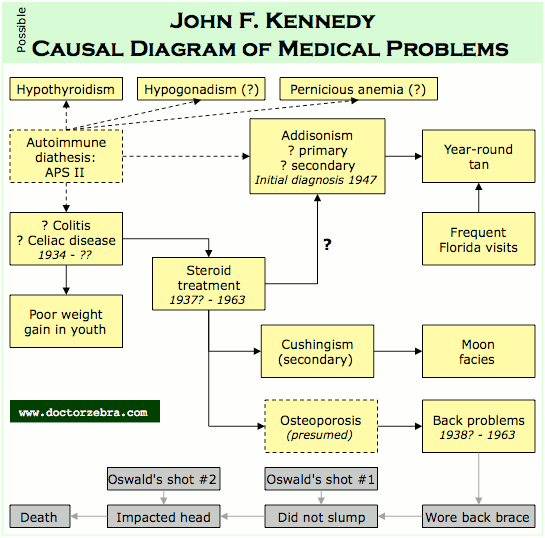

⬅ John Kennedy: Hospitalization Chronology
Bumgarner provides an excellent short recap of Kennedy's medical history 1a, although the new medical sources pioneered by Dallek 2 3 are leaving it behind.
Dr. Lee Mandel 4 has recently offered a unifying medical diagnosis for Kennedy: auto-immune polyendocrine syndrome type II (APS II).
Dr. Mandel notes that Kennedy had signs of adrenal failure as early as 1940, and that his autopsy almost certainly indicates this was auto-immune in origin. Kennedy was diagnosed with hypothyroidism in 1955 and was under treatment for years (see below). 4 Comment: [Technical] APS II is a polygenic disorder defined as: (a) auto-immune adrenocortical failure plus (b) evidence of adrenal inflammation plus (c) either auto-immune thyroid disease or type 1 diabetes mellitus. The peak age of onset is 30. (JFK was 30 when his adrenal insufficiency was diagnosed.) Other associated autoimmune disorders include: atrophic gastritis (with or without pernicious anemia), hypergonadotrophic hypogonadism, and celiac disease.
The diagram below summarizes the possible interplay between Kennedy's medical problems. The rest of this page has details.

Kennedy lived in Boston from 1917 to 1927, then New York from 1927-1930. He was at various boarding schools in Connecticut from 1930-1935, visited Europe for the first time in the summer and fall of 1935 3a, was briefly a Princeton student until December 1935, visited Arizona for two months in April-June 1936, then enrolled at Harvard in the fall of 1936. He took another European tour in summer 1937 3b, worked in London during summer 1938 3c, and spent Feb.-Sept. 1939 in Europe with trips as far afield as Damascus and Beirut 3d. After graduating from Harvard in 1940, Kennedy spent a term at Stanford in fall 1940 3e. He visited 8 countries in South and Central America in spring 1941 3f. Kennedy entered the US Navy in October 1941 3g and reached the Pacific theater in March 1943 3h. PT-109 sank on Aug. 1, 1943 3i.
- Feb. 1919 - Hospitalized with scarlet fever for two months, followed by two weeks in a Maine sanatorium. 3j
- April 1931 - Operation for presumed appendicitis at Danbury Hospital, Connecticut. It is not clear from the reference whether the operation was merely recommended, or actually performed 3k. His Navy medical records recorded a 1932 appendectomy. 3l
- Nov. 1931 - "A mild cold" put him in the hospital for two nights. 3k
- Jan. 1932 - A "cold" which turned into "quite a cough" put him in the boarding school infirmary for more than a week. 3k
- April 1932 - Admitted to the infirmary because of a cold, swollen glands, and "an abnormal urine sample." 3k
- Jan. 1934 - Kennedy "became very sick and had to be rushed by ambulance to New Haven Hospital for observation." 3m
- June 1934 - Spent two weeks at the Mayo Clinic in Rochester, Minnesota, described as "The Goddamnest hole I've ever seen." He was transferred to St. Mary's Hospital nearby, spending a total of one month in the two institutions. 3n
- April 1935 - A "short stay in the [boarding school] infirmary." 3o
- Oct. 1935 - Hospitalized in London while studying at the London School of Economics. He had a "quick recovery." 3o
- Dec. 1935 - Illness "sent him to Peter Brent Brigham Hospital in Boston," where he spent almost two months. He could leave the hospital on weekends to socialize. 3p. He also "socialized" in the hospital, in the bathtub 3q.
- Spring 1937 - In Harvard's Stillman Infirmary for a recurrence of his mystery illness. The hospitalization was short: he did not lose school time as a result. 5a
- Feb. 1938 - Mayo Clinic 3r
- Feb. 1938 - In the Harvard infirmary with grippe (not clear if he was admitted) 3r
- March 1938 - Spent two weeks in New England Baptist Hospital with "an intestinal type infection." 3r
- June 1938 - Again spent two weeks in New England Baptist, for the same problem as in March 1938. 3r
- Feb. 1939 - Mayo Clinic 3r
- late 1940 - Hospitalized for 10 days at the Lahey Clinic (Boston) because of lower right back pain that came on abruptly during a tennis game. 3s
- Jan. 1944 - Examined at the Mayo Clinic. (It is unclear from the reference whether he was admitted, but admission was probably Mayo's standard practice then). 3t
- Feb. 1944 - Evaluated at New England Baptist Hospital for his back. (The reference is again unclear whether he was admitted.) 3t
- June 1944 - Admitted to Chelsea Naval Hospital in Boston on June 11, where he was diagnosed as having a ruptured disk in his back. After 11 days he was transferred to the Lahey Clinic, where he underwent his first back operation. He was transferred back to Chelsea Naval Hospital in August 3u. The hospitalization was, in total, at least 8 weeks 3v.
- April 1945 - Mayo Clinic 3w
- ±Sept. 1947 - Hospitalized in the London Clinic (England) with Addison disease 3x
- July 1953 - Entered George Washington University Hospital (Washington, DC) for back treatment 3y
- April 1954 - Admitted to the Lahey Clinic for consultations about his back 3z
- July 1954 - Short admission to Bethesda Naval Hospital for back problems 3z
- Oct. 1954 - Admitted to the Hospital for Special Surgery (New York) on the 10th for back surgery, which was postponed three times until Oct. 21. HIs post-operative course was stormy (he received the last rites at one point), and he was not discharged until December. 3aa
- Feb. 1955 - A re-operation at the Hospital for Special Surgery removed the ~ metal plate that had been implanted the previous October 3aa
- Apr. 1955 - Hospital for Special Surgery (New York) - For a checkup after the spinal fusion. 6a
- May 26, 1955 - New York Hospital - Baker Pavillion, room 1052. He stayed for one week, for an initial evaluation of his back pain by Dr. Travell. 6b. Dallek describes "terrible back pain" as causing the admission 3ab.
- July 3, 1955 - One-day hospitalization at New England Baptist Hospital 3ab. Marion says this hospitalization lasted from July 3 to July 10 5b. Travell does not mention this hospitalization.
- July 14, 1955 - Admitted to New York Hospital for one week because of back pain and diarrhea 3ab. Travell does not mention this hospitalization.
- Jan. 11-13, 1956 - New York Hospital - same room as May 1955. Travell says she admitted Kennedy "for a general review by Dr. Cohen" (Kennedy's new endocrinologist, Eugene J. Cohen) 6c. Dallek describes this as a hospitalization for "large doses of antibiotics to counter respiratory and urinary tract infections," as well as cystoscopy under anesthesia 3ab.
- end-Jan. 1956 - Two days in New York Hospital because of "nausea, vomiting, dehydration, and continuing urinary discomfort" 3ab. Travell does not mention this hospitalization.
- July 18, 1956 - Admitted for two days to New York Hospital because of abdominal cramps 3ab. Travell does not mention this hospitalization.
- Sept.-Oct. 1956 - There were 3 hospitalizations in Sept.-Oct. 1956 3ab. Travell does not mention them.
- Sept.-Oct. 1956 - There were 3 hospitalizations in Sept.-Oct. 1956 3ab. Travell does not mention them.
- Sept.-Oct. 1956 - There were 3 hospitalizations in Sept.-Oct. 1956 3ab. Travell does not mention them.
- Sept. 1957 - New York Hospital - For incision and drainage of a soft-tissue abscess under general anesthesia. 6d
- [There may be more. This is as far as Dr. Zebra has gotten.]
His medical care at Parkland Memorial Hospital on Nov. 22, 1963 does not count as a hospitalization -- because he never made it out of the Emergency Room.
- Bumgarner, John R. The Health of the Presidents: The 41 United States Presidents Through 1993 from a Physician's Point of View. Jefferson, NC: MacFarland & Company, 1994.
 a pp.234-249
a pp.234-249Comment: Devotes one chapter to each President, through Clinton. Written for the layperson, well-referenced, with areas of speculation clearly identified, Dr. Zebra depends heavily on this book. Dr. Bumgarner survived the Bataan Death March and has written an unforgettable book casting a physician's eye on that experience.
- Dallek, Robert. The medical ordeals of JFK. Atlantic Monthly. 2002 (Dec);290(5):49-61.
- Dallek, Robert. An Unfinished Life: John F. Kennedy 1917-1963. Boston: Little, Brown, 2003.
- Mandel LR. Endocrine and autoimmune aspects of the health history of John F. Kennedy. Annals of Internal Medicine. 2009; 151: 350-354.
Comment: Available on the web at: http://annals.org/cgi/content/full/151/5/350
- Marion, Robert. Was George Washington Really the Father of our Country?. Reading, MA: Addison-Wesley, 1994.
 a p.175 b p.192
a p.175 b p.192 - Travell, Janet. Office Hours: Day and Night. Cleveland, OH: New American Library, 1968.
a p.3 b p.7 c p.315 d p.320
Comment: Travell was one of Kennedy's physicians during his Presidency. Although all autobiographies are inherently narcissistic, the level in this one is tough to stomach -- almost as bad as Jerry Linenger's, in fact.

